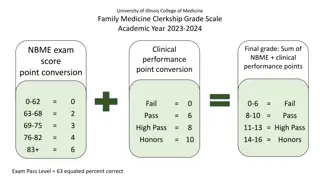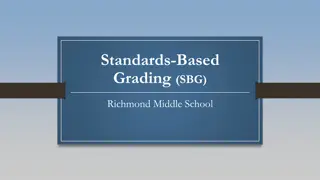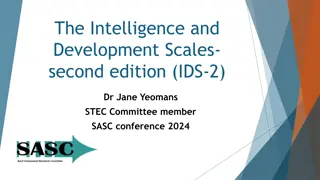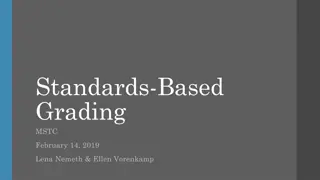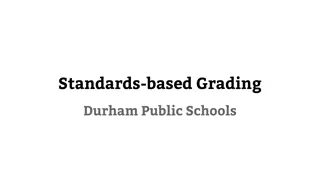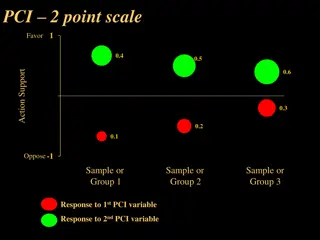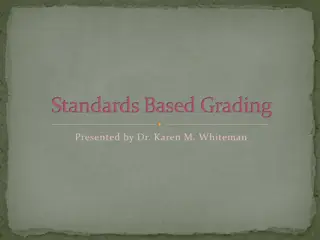Grading for Equity Independent Study Program
Explore the concepts of equitable grading with a focus on historical context, bias recognition, and motivational elements. Join thought partners in studying Joe Feldman's book to transform grading practices for all students. Engage in live facilitated discussions and sessions to delve into the princ
3 views • 11 slides
Review of Grading Practices in PWCS and BRMS
This document outlines the assessment and grading practices in Prince William County Schools (PWCS) and Bull Run Middle School (BRMS) with a focus on providing feedback, enhancing student learning, and aligning assessments with learning outcomes. It includes information on assessment purposes, forma
3 views • 12 slides
Understanding Vernier Scales and Precision Measurement Devices
Vernier scales, named after French cartographer Pierre Vernier, enhance precision in measuring even the smallest scale divisions. Instruments like the theodolite, slide calipers, and Fortin's barometer utilize vernier scales for accurate readings. Learn about key terms like least count and vernier c
5 views • 11 slides
WMO Scale of Assessment of Members' Contributions for 2024-2027 Period
The WMO scale of assessment for members' contributions is based on the latest United Nations scales approved by the General Assembly. The scales for the 2024-2027 period will be determined considering the UN scales from the 2021 and 2024 sessions. Adjustments for membership differences will be made,
4 views • 6 slides
Cybercrime Course Overview: Syllabus, Materials, and Grading
This Cybercrime course overview introduces Dr. Matthew Petrocelli as the instructor and details the syllabus organization, course materials, and grading system. The course is structured into 10 learning units covering various aspects of cybercrime, including information assurance, cyber law, investi
7 views • 11 slides
Understanding Measurement Scales and Scaling Techniques
Measurement scales play a crucial role in marketing research, with techniques like scaling helping to categorize data. The content discusses four types of measurement scales: nominal, ordinal, interval, and ratio, outlining their characteristics and differences. Scaling techniques involve placing re
5 views • 7 slides
University of Illinois College of Medicine Clerkship Grade Scales 2023-2024
Final grade scales for various clerkships at the University of Illinois College of Medicine for the academic year 2023-2024 are provided. The grading criteria include a combination of NBME exam scores and clinical performance points, with corresponding grade conversions ranging from Fail to Honors b
0 views • 7 slides
Standards-Based Grading (SBG)
Richmond Middle School implements Standards-Based Grading (SBG), focusing on student mastery of learning standards rather than traditional grading methods. The school emphasizes the importance of meaningful grades that reflect achievement of learning goals, providing students with opportunities to r
0 views • 19 slides
Overview of Acute Cholecystitis: Diagnosis, Severity Grading, and Treatment
Acute calculous cholecystitis is a common digestive disease with varying treatment perspectives. The Tokyo Guidelines 2018 provide criteria and severity grading for the diagnosis of acute cholecystitis. Diagnosis involves local and systemic signs of inflammation along with specific imaging findings.
0 views • 18 slides
Equitable Grading Practices: Pillars, Zero Policies, and Minimum Grading
Explore the three pillars of equitable grading: accuracy, bias-resistance, and motivation. Learn about the impact of giving zeros on student grades and discover alternative approaches. Delve into the concept of minimum grading and how adjusting grading scales can enhance student engagement and succe
1 views • 48 slides
Food Processing Operations: Cleaning, Sorting, and Grading
Food processing operations such as cleaning, sorting, and grading are crucial to ensure high-quality and safe food products. Cleaning removes contaminants, sorting separates foods based on physical properties like size and color, and grading ensures uniformity. Wet and dry cleaning methods are emplo
1 views • 11 slides
Understanding Grading and Staging of Malignant Tumors in Cancer Patients
Grading and staging are crucial in determining the aggressiveness and extent of malignant tumors. Grading involves assessing the level of malignancy based on cell differentiation and mitotic activity, while staging considers the size of the tumor, lymph node involvement, and presence of metastases.
7 views • 31 slides
Comprehensive Overview of the Intelligence and Development Scales - Second Edition (IDS-2)
The Intelligence and Development Scales - Second Edition (IDS-2), developed by Dr. Jane Yeomans, is a comprehensive assessment tool for individuals aged 5 to 21. It includes cognitive and general development domains, with subtests covering intelligence scales, executive functions, psychomotor skills
0 views • 25 slides
Mastering Color in Film: A Comprehensive Guide to Using Color Grading Techniques
Explore the intricate world of color in filmmaking through understanding color grading, log explained, Log rec.709, color correction, and grading techniques without LUTs. Enhance your storytelling by harnessing the power of color to evoke emotions and create visual impact in your films.
1 views • 6 slides
Understanding Scales in Maps and Plans
Explore the concept of scales in maps and plans, including number scales and bar scales. Learn how to work with different scales, calculate actual distances, and understand the advantages and disadvantages of each scale type. Engage in activities to reinforce your understanding of scales in a practi
0 views • 32 slides
Understanding Clerkship Grading in Medical Education
Clerkship grading in medical education provides feedback on a student's performance and readiness to become a competent physician. Grades in pre-clinical years are often based on objective data from multiple-choice testing, while clinical years involve assessing a broader range of skills including p
0 views • 23 slides
Understanding Standards-Based Grading: A Comprehensive Overview
Exploring the evolution and purpose of grading systems, this presentation delves into the history, research findings, and necessity for adopting standards-based grading. Through a series of engaging activities and discussions, stakeholders gain insights into the impact of grading on student learning
0 views • 33 slides
Transitioning to Standards-Based Grading in Education
Evaluation of learner performance through traditional grading may not align with the skills required in the workforce. To address this, a shift to standards-based grading is advocated. This system assesses student progress based on specific learning standards, providing clear feedback and evaluation
0 views • 33 slides
Enhancing Assessment Strategies in Education: A Focus on Standards-Based Grading
Explore the principles of standards-based grading in education, emphasizing the importance of consistent, meaningful, and accurate grading to support student learning. Learn how grades should reflect a student's understanding at a specific time and how assessments can communicate performance on indi
0 views • 30 slides
IMBA English Fall 2019: Lesson 8 Course Overview and Grading Details
Course outline of IMBA English Fall 2019 Lesson 8 includes a breakdown of the grading scheme, details on assignments, participation, performance in court case activities, and final exam structure. The summary also emphasizes the importance of following instructions for PPT submissions and how to add
0 views • 75 slides
Guide to Grading and Rating Process for Chess Tournaments
Learn the step-by-step process of submitting tournament results for grading and rating, including generating FIDE-rating and ECF-grading files. Understand the importance of FIDE IDs, updating player information, and handling new players without FIDE IDs. Follow clear instructions on generating and h
1 views • 8 slides
Engineering Scale and Different Types of Scales
Engineering scale plays a crucial role in reducing or enlarging dimensions of large or tiny objects to fit standard size drawing sheets. This article covers the concept of reducing scale, representative factor, types of scales like plain, diagonal, vernier, and more, along with detailed construction
0 views • 11 slides
Enhancing Mathematical Learning Through Innovative Grading Techniques
Valparaiso University implemented an alternative grading system in their calculus courses to improve student performance, particularly for underrepresented minority and first-generation students. The standards-based grading method emphasized deep understanding of essential topics, leading to better
0 views • 12 slides
Classroom Expectations and Student Behaviors with Mrs. Ivani: Srednja trgovska ola Ljubljana
Explore the classroom expectations for English class with Mrs. Ivani at Srednja trgovska ola Ljubljana, focusing on student behaviors, respect, responsibility for coursework, promoting lifelong learning, policies, and grading criteria. Ensure punctuality, preparedness, respect for others, responsibi
0 views • 8 slides
Understanding Meat Grading and Quality Certification
Explore the process of meat grading and certification, including the establishment of USDA standards, mandatory inspection for wholesomeness, voluntary grading for quality, and the determination of quality grades based on factors like tenderness, juiciness, flavor, and marbling. Learn how age and ma
0 views • 15 slides
Exploring Likert Scale and Survey Examples for Effective Data Collection
Dive into the world of Likert scale with examples for surveys covering agreement, relevance, frequency, importance, quality, likelihood, dichotomous scales, three-point scales, four-point scales, five-point scales, and seven-point scales. Understand the nuances of expressing opinions, preferences, a
0 views • 5 slides
College Poster Project Schedule and Grading Details
Schedule and details for a college poster project, including assignments, due dates, research objectives, grading criteria, and presentation expectations. Students are required to research and present information about their dream colleges, focusing on various aspects such as location, size, academi
0 views • 25 slides
Updates on Graduate School Policy and Interim Grading for Spring 2020
Explore the latest policy updates for graduate school including the interim grading policy for Spring 2020. Learn about options for grading, deadlines for decisions, and resources available to address questions and concerns. Understand the difference between grades like W and NCR and how they impact
0 views • 12 slides
Comprehensive Overview of Point Contrast Interview Scales
Explore a detailed comparison of various Point Contrast Interview scales ranging from 2-point to 9-point scales. Each scale reflects different levels of favor, action support, uncertainty, and opposition, along with sample responses. The scales provide a structured framework for assessing opinions a
0 views • 8 slides
Education Updates and Grading Policy Adjustments during School Closure
Amidst challenges like varied access to technology and disruptions in schooling, Syracuse City School District implements measures to support students during closure. Actions include guidance for making up work, stakeholder outreach for feedback on grading alternatives, and adjustments in the gradin
0 views • 7 slides
Understanding Grading and Credit Policies at Centennial High School
Learn about Centennial High School's grading policies, credit requirements, and course options for the school year. Explore how credits are earned, grading scales, GPA calculation methods, and the importance of high school credits earned in middle school.
0 views • 30 slides
Physical Education Grading Policy and Procedures at CDHS
Physical Education at CDHS follows a detailed grading policy where each class is worth 10 points. Points are earned based on participation, effort, behavior, and adherence to rules. Deductions can occur for violations such as tardiness, inappropriate behavior, lack of participation, and disrespect o
0 views • 22 slides
Understanding Standards-Based Grading for Educators
Learn about Standards-Based Grading (SBG) presented by Dr. Karen M. Whiteman, including the agenda overview, workshop norms, housekeeping items, and the shift needed for transitioning to a standards-based system. Discover the differences between Assessment-Based Grading and SBG, and engage in discus
0 views • 84 slides
Insights from Discussions with Admissions Officials on School Profiles, Grading Scales, and Admissions Criteria
Discussions with university officials shed light on the importance of school profiles, grading scale variations, and admissions criteria. Insights include the significance of school profiles, diversity in grading scales, and the role of NHS in the admissions process. Admissions offices consider fact
0 views • 25 slides
Rethinking Grading Systems in Education
Research suggests that traditional grading systems may hinder student learning and motivation, leading to decreased interest, shallow thinking, and cheating. Ungrading, a more student-centered approach, promotes intrinsic motivation, allowing students to have a say in their assessment and emphasizin
0 views • 16 slides
Effective Feedback Strategies for Grading in Epidemiology Courses
In teaching epidemiology courses, maintaining consistency in grading among multiple TAs is crucial. Providing high-quality feedback is essential as it builds the foundation for future learning. This article emphasizes the importance of effective feedback, tips for giving feedback, creating grading k
0 views • 12 slides
Severe Grading in Modern Foreign Languages: A Comprehensive Review
Delve into the extensive history and ongoing efforts regarding severe grading in Modern Foreign Languages (MFL) by key figures such as Nick Mair, with collaborations from organizations like ISMLA, ALL, and ASCL. Learn about the challenges, debates, and initiatives surrounding MFL grading issues over
0 views • 24 slides
Understanding the Reforms of GCSE Qualifications and Grading in HE Admissions
Delve into the changes in GCSE qualifications for Higher Education (HE) admissions. Explore the timeline for reforms, implications on grading structure, and new standards set for GCSEs. Gain insights into the introduction of a new numbered grading scale and the significance of the National Reference
0 views • 14 slides
Getting Started with Specifications Grading in Computer Science
Dr. Michael S. Kirkpatrick from JMU presents a detailed grading scheme involving readiness tests, project deadlines, reflections, team projects, and exams in his symposium on specifications grading. The importance of grading and its impact on learning outcomes are discussed, along with insights on e
0 views • 25 slides
Understanding Scales and Representative Fractions in Technical Drawings
Scales play a crucial role in technical drawings by representing the ratio of the linear dimensions of an object to its actual dimensions. This text explains the concept of scales, including enlargement and reduction scales, representative fractions (RF), recommended scales by BIS (SP.46: 2003), and
0 views • 29 slides






